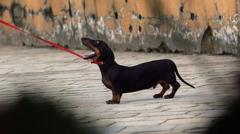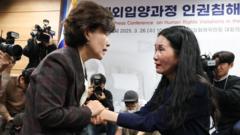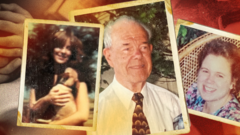Struggles Against Systemic Bias: Greenlandic Families Fought to Reclaim Their Children
When Keira's daughter was born last November, she was given only two hours with her before the baby was taken into care. ‘I kept looking at the clock,’ Keira recalled, marking every moment before her daughter, Zammi, was taken. ‘It felt like a part of my soul died,’ she said. Keira is one among many Greenlandic families in Denmark yearning for their children after questionable parenting competency tests, referred to as FKUs, were used to assess their parenting skills.
In May, the Danish government responded to critiques of these assessments by banning them for Greenlandic families, although they remain in use in other instances across Denmark. Critics have long argued that FKUs are biased against Indigenous Inuit cultures, as they are often conducted in Danish, rather than in Kalaallisut, the mother tongue of Greenlanders. This disconnect can breed misunderstandings, as indicated by the significant disparity in removal rates—Greenlandic parents are 5.6 times more likely to have their children taken into custody compared to their Danish counterparts.
The detailed assessments consist of interviews and various cognitive tasks designed to test knowledge and emotional intelligence. Yet, defenders argue these tests offer a more objective method than relying solely on subjective observations from social workers. Critics counter that such assessments—and their reliance on cultural norms based in Danish traditions—fail to accurately predict parenting capability.
Keira, who has two other children previously taken into care, is hopeful to reunite with her baby. Every week, she is allowed to visit Zammi in foster care. Each time she brings flowers and traditional Greenlandic foods, a token of her culture to accompany their connection.
Another couple, Johanne and Ulrik, disenfranchised by a similar experience, are also fighting their battles. Their son, taken into care shortly after birth, was adopted and remains unreachable to them. Johanne’s earlier assessments categorized her in derogatory terms, which she stoutly refutes and rejects.
As the Danish government embarks on a review of cases involving Greenlandic families, both hope and frustration reign among affected parents. Despite the challenges, the resilience of these families embodies a broader struggle against systemic biases and a fight for their rightful roles as caregivers.
Pilinguaq is a remarkable case; after four years apart, she was recently reunited with her daughter after proving her commitment to parenting and securing a stable environment. Her journey exemplifies the ongoing efforts of Greenlandic families, and their fight underscores the broader issue of cultural sensitivity and parental rights in placing children into care.
The emotional and social toll on these families is profound, yet the commitment to reunification remains strong. Keira states emphatically, ‘I will not stop fighting for my children.’ This fighting spirit persists amidst systemic odds, aiming for a future where no child is separated from their roots.





















